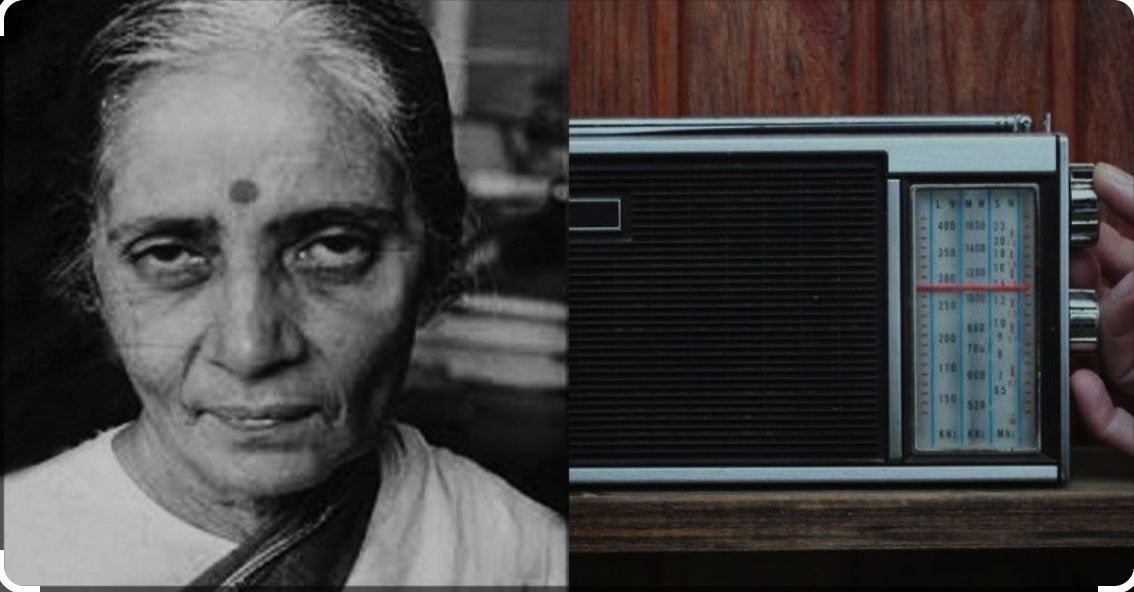Usha Mehta

- 22 Mar 2024
Why is it in the News?
A recent film has been launched, depicting the inspiring life story of Indian freedom fighter Usha Mehta.
About Usha Mehta:
- Born in 1920 in the village of Saras, near Surat in Gujarat, Usha Mehta, affectionately known as Ushaben, embodied the Gandhian principles of non-violence and civil disobedience from a young age.
Early Activism:
- At the tender age of eight in 1928, she participated in a protest march against the Simon Commission, demonstrating her early commitment to India's independence struggle.
- The Secret Congress Radio: In 1942, amidst the fervor of the Quit India Movement, Usha Mehta and her colleagues boldly established the Secret Congress Radio.
- This clandestine radio station played a pivotal role in connecting freedom movement leaders with the masses, ensuring the dissemination of crucial information, and maintaining the spirit of resistance against colonial rule.
Establishing an Underground Radio Station:
- With the outbreak of the War in 1939, the British government imposed stringent measures, including the suspension of all amateur radio licenses throughout the Empire.
- Operators were mandated to surrender their equipment to the authorities, under threat of severe repercussions for non-compliance.
Key Figures in the Operation:
- Usha Mehta, alongside Babubhai Khakar, Vithalbhai Jhaveri, and Chandrakant Jhaveri, played instrumental roles in orchestrating the Congress Radio initiative, defying the ban on amateur radio broadcasting.
The Congress Radio Trial:
- The trial of the five accused individuals—Usha Mehta, Babubhai Khakar, Vithalbhai Jhaveri, Chandrakant Jhaveri, and Nanak Gainchand Motwane, who facilitated crucial equipment—captivated public attention in Bombay.
- While Vithalbhai and Motwane were acquitted, Mehta, Babubhai, and Chandrakant faced severe sentences for their involvement.
Usha Mehta's Legacy:
- Following her release from Pune's Yerawada Jail in March 1946, Usha Mehta was lauded in nationalist circles as "Radio-ben," symbolizing her courageous defiance and commitment to the freedom struggle through underground broadcasting.
Independence, PhD, & Padma Vibhushan
- When India finally achieved independence in 1947, the British had divided the country into two parts – India and Pakistan, sending the region into chaos.
- The divide results in massive bloodshed with more than 10 million Hindus, Muslims, and Sikhs seeking to find their home.
- Mehta was torn. “In a way, I was very happy, but sad at the same time because of partition.
- It was an independent India but a divided India,” she was quoted as saying in the book Freedom Fighters Remembered.
- She was away from active politics in independent India due to her ill health but continued to remain a staunch Gandhian till the very end.
- She penned the script for a documentary on Gandhi produced by her colleague at the radio station, and earned a PhD in Gandhian thought at the University of Bombay.
- She taught political science and ran the politics department at the university.
- She also taught at Wilson College for 30 years.
- She was also the president of the Gandhi Peace Foundation.
- In 1998, she was awarded India’s highest civilian honor, the Padma Vibhushan.
- She lived a simple life and never married or had children.
- She died on 11 August 2000 at the age of 80.
